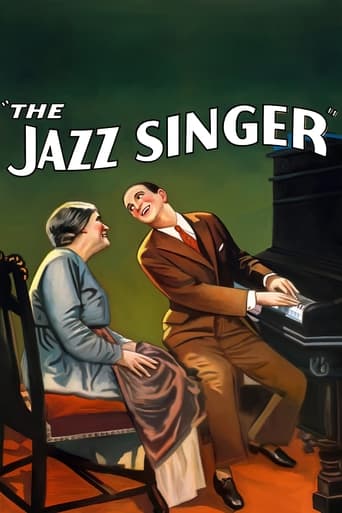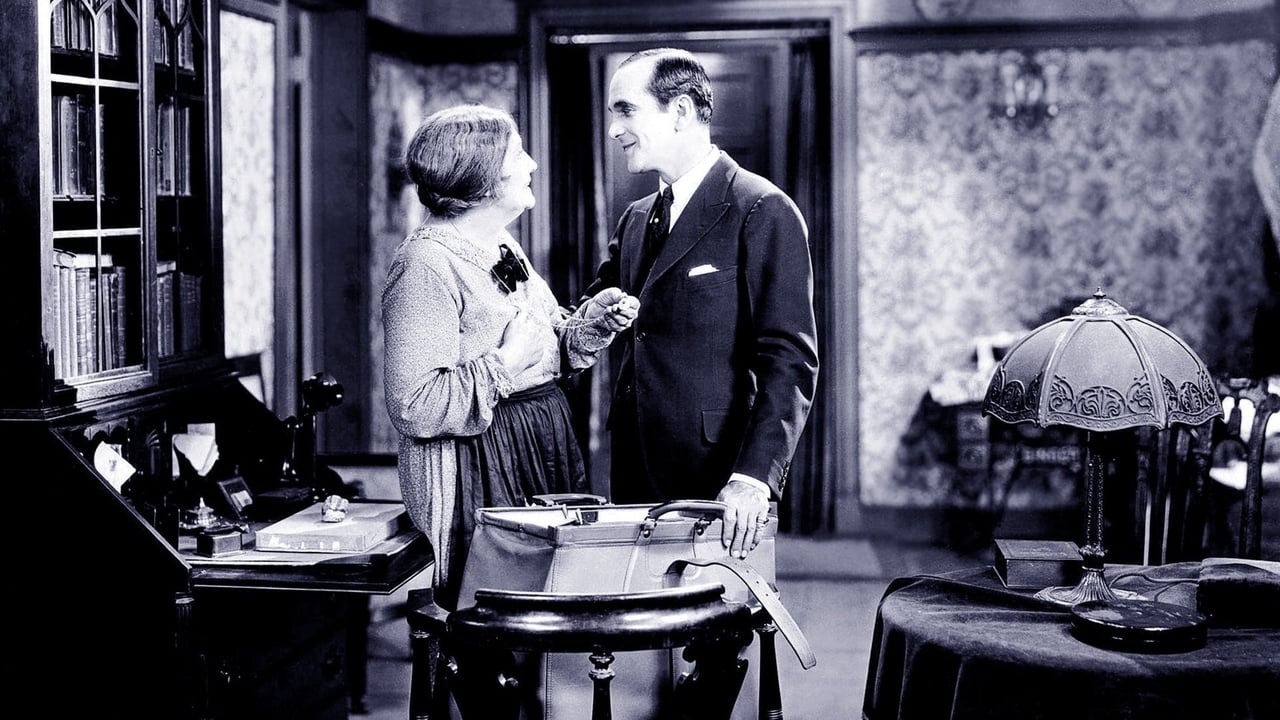Matreats :P
Made in 1927 and starring Al Jolson, The Jazz Singer was a film that impacted Hollywood forever. It was the first film with sound that was a commercial success, and led to silent films being completely scrapped in favor of sound. Within three years of The Jazz Singer's release, silent movies were no longer produced.The plot for the movie is very simple and easy to understand: A father who has been a Cantor, or a singer in a Jewish synagogue, wants his son, Jackie Rabinowitz, to follow in his footstep and become one as well. For five generations the prestigious Cantor position has been passed on from father to son, and the father argues that Jackie must become a Cantor to follow the tradition. Jackie has other plans however, and wants to follow his own dream of becoming a Jazz singer. His father highly disagrees with his decision, and Jackie ends up leaving the house to pursue his dream.The sound quality was good for a movie made in the 1920's, and set the mood well for the high tension and the calmer scenes. However, that there wasn't much of a pause in the music, and they could've had breaks and decrescendos so it wasn't so much of a flat sound. The changes from silent to sound, then back again after a song number or performance was a bit sudden, but they were trying out sound in movies for the first time. The actual songs that were sung had seemingly random spoken parts that staggered and threw off the beat for me, and left some awkward pauses. They were pretty exaggerated; a bit too much for my liking. The music style was different then, and I realize that, but the song choice still isn't my favorite.Almost immediately, it was obvious that the film wasn't as good of quality as some of the older movies like the 1927 version of The Phantom of the Opera. The lighting in the background when the beginning credits came up made some of the text impossible to read. It was noticeable throughout the movie, that any white or light colors were too bright, and it made it look like they were glowing. It was distracting from the surroundings, and in some scenes, you could hardly tell who a person or a thing was. I did appreciate the use of flashbacks though, which brought more emotion and meaning to Jackie's thoughts. The memory fading in and out helped us understand what he was thinking without him having to say it or spell it out for the viewer. Flashbacks are something we still use today in modern movies to great effect.This film was good, but it wasn't the best. The story line in itself is cliché, and they shouldn't have resolved the ending like they did. It felt like it disregarded the climax and the main conflict. To close, I would rate The Jazz Singer at 5 stars, and although it is a very influential film in movie history, I probably wouldn't watch it again.
Angus T. Cat
In a review here on IMDb of Jerry Lewis' 1959 TV version of the Jazz Singer a reviewer stated that the Jazz Singer is a film very much of its time. I've now seen four versions: Lewis' TV adaption, the original with Al Jolson, the 1952 Danny Thomas version, the Neil Diamond 1980s version, and Jerry Lewis' TV adaption. I now understand why the Jazz Singer belongs to its original time period. It's not a story about a jazz singer - though all the versions over the years have kept the title. At first I thought it was Jolson's personality and performance that made the story legendary. Certainly the power of hearing Jolson sing was instrumental in making the original movie a sensation.The story is about the old clashing with the new: it's apt that it was chosen for Jolson's vehicle, part silent mixed with the scenes of Jolson singing (as I remember it, none of the scenes with sound were all dialogue: all featured singing, and two of the singing voices weren't Jolson's).It's also about the old generation clashing with the new generation: the father's old world cantor struggling with the son's new world show business song and dance man.The story doesn't really work in the later versions. Jerry Lewis was a good singer and he's fantastic in the opening sequence. But his version is really more about him as a comic. The Thomas version is bland and pedestrian. The Neil Diamond version is cheesy and unconvincing: for one thing, he's not a jazz singer, he's a pop singer. The later movies are dominated by the echoes of the elements of the Jolson movie, already clichés by the end of the 1920s: the big show, the big chance, the call to his father's deathbed, and the last scene with the son honoring the father.The original is charged by its reflections of Jewish culture: the big chance comes on the evening of Yom Kippur, and the son's reconciliation comes through performing his father's role of singing Kol Nidre and leading the evening services. For me one of the most powerful sequences of the movie doesn't feature Jolson singing: it's the scene in which his character hears Yossele Rosenblatt singing- in a theater, note, not in a synagogue. I realized that the Jazz Singer also echoes the anxieties of the first European born generation regarding the American born second generation: will they keep the traditions, or reject everything, including morality and religious belief. The 1950s versions- both the Thomas movie and Lewis' TV play- have a father who is evidently American as well. Hence the story doesn't have the resonance of the fears of adjusting to a new country and the freedom it brings. (Diamond's version features a father who is a Holocaust survivor, but as I remember it the movie doesn't greatly explore the father's ambivalence towards the openness of American society.)The later movies are also dominated by the echoes of Jolson's performance, not just his singing, but also in the scenes in which he pays tribute to his father and his heritage by leading the Kol Nidre service. It's both interesting and bizarre that in the closing of the Lewis version, Jerry Lewis is wearing cantor's robes and his clown makeup in the synagogue before the congregation- a reference to Jolson as a show business legend and to Jolson's performance as Jack Robin, the son conquering the new world with its modern new media, and at the same time continuing the culture of his heritage. The movie still has much to say to modern audiences. And despite the limitations of the early sound technology the outdated conventions of silent film acting and storytelling, and the numbers in blackface which are now seen as offensive, Jolson shines in the performance of his life.
thermodon1
Seldom do I give a 10 star rating as few films are perfect, but this movie is as close to perfect as it could get for a silent film. The story line is sweet, the dubbed over original soundtrack is wonderful, making it interesting, and never left me wanting it to hurry up and end. Because this movie is available on Blu-ray, made it even better for having the quality it deserves. It certainly should be listed as a classic silent film in the top 100 of the genre. To rate this movie with just one word,"Fantastic", would be more than enough. It would be fair to say that this great early film is wonderful as the other top silent films of the age, such as the Big Parade, Wings, Sunrise, the Crowd and many, many others.
evening1
Beautifully depicted drama about the struggle to be an individual amidst the conflicting influences of one's culture and society.Al Jolson is stellar as Jaky Rabinowitz, who has been called from a young age to sing the jazz songs of his time. But his father, a fourth-generation cantor, would rather disown Jaky than watch him assimilate."Would you be the first Rabinowitz in five generations to fail his God?" "I'd love to sing for my people but I belong here," Jaky says of the theater. His mother, who loves her husband as deeply as her only child, believes God wishes Jaky to follow his heart.One feels deeply for the struggle of the protagonist, even as we see him apply black-face makeup, a convention of the time, and warble songs like "Mammy" that seem dated and campy now.The film affectionately depicts Jewish domestic life, employing Yiddish intonation through the card titles. The traditional Jewish liturgy finds sensitive portrayal in the movie's climactic Kol Nidre scene.The performances here are uniformly strong. Jolson is believable in his classic struggle to find his true self. Eugenie Besserer and Warner Oland, neither of whom was Jewish, are convincing as Jaky's pious parents. Otto Lederer is warmly endearing as the "kibitzer" Yudelson. And beautiful May McAvoy is a joy as Jaky's inspiring love interest.Everything about this movie rings true for me."Remember, a son's a son no matter if his papa throws him out a hundred times."



 AD
AD



